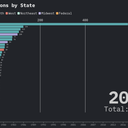
After spending more than a year studying Oklahoma’s capital punishment practices, the Oklahoma Death Penalty Review Commission has unanimously recommended that the state extend its current moratorium on executions “until significant reforms are accomplished.” The bipartisan commission issued its report on April 25, 2017, reaching what it characterized as “disturbing” findings that “led Commission members to question whether the death penalty can be administered in a way that ensures no innocent person is put to death.” The report contains recommendations for more than 40 reforms to virtually all areas of Oklahoma’s death penalty system. Oklahoma has not carried out an execution since January 15, 2015, when the state used an unauthorized drug to execute Charles Warner. On October 16, 2015, lawyers for the state agreed to a federal court order barring executions until at least five months after a new execution protocol is in place. Warner’s execution also prompted a grand jury investigation, which, like the Commission report, was highly critical of Oklahoma’s capital punishment system. The Commission, whose eleven members included former Oklahoma Governor Brad Henry, Judge Reta M. Stubhar of the Oklahoma Court of Criminal Appeals, attorneys, law professors, mental health professionals, and others, examined the death penalty process from arrest to execution. The report states, “Commission members agreed that, at a minimum, those who are sentenced to death should receive this sentence only after a fair and impartial process that ensures they deserve the ultimate penalty of death. … Unfortunately, a review of the evidence demonstrates that the death penalty, even in Oklahoma, has not always been imposed and carried out fairly, consistently, and humanely, as required by the federal and state constitutions. These shortcomings have severe consequences for the accused and their families, for victims and their families, and for all citizens of Oklahoma.” In particular, the Commission raised concerns about wrongful convictions, focusing 10 recommendations on the issue of “innocence protection.” Other recommendations dealt with forensic practices, training of prosecutors, defense attorneys, and judges, determinations of death eligibility, the clemency process, and the execution protocol.
(S. Vincent, “Keep executions on hold ‘until significant reforms are accomplished,’ Oklahoma Death Penalty Review Commission says,” Tulsa World, April 25, 2017; “The Report of the Oklahoma Death Penalty Review Commission,” Oklahoma Death Penalty Review Commission, April 25, 2017.) See Studies and Oklahoma.



